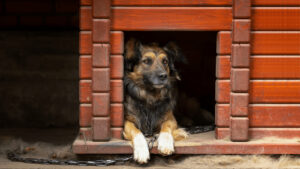Joint problems can exist in all dogs, although it is more likely in older dogs. With time, their cartilage wears down, which results in arthritis, osteoarthritis, and more. You don’t have to wait until the problem gets out of hand; if you’re a caring owner, you should know how to keep your dogs’ joints healthy.

The common joints affected, according to Vet West, are hips, knees, elbows, and shoulders. Knowing how to keep these joints healthy will help your dog live a happier life and will be more appreciated when they age. Here, we will look at how to prevent joint problems in dogs, how to keep dog joints healthy, and possible causes of joint problems in dogs.
Table of Contents
How To Keep Dog Joints Healthy
There are many ways to keep a dog joint healthier. Let’s take a look at some of them.
This post contains affiliate links. However all the information provided on this site are my own honest opinions. See more in Disclaimer.
Regular Exercising and Proper Diet
Lack of exercise is a major reason why many dogs get obese and obese dogs are at a high risk of developing joint problems as they age. Another thing that leads to obesity in dogs is feeding your dog the wrong diet and too many treats. Both of these things should be monitored when working on maintaining good joint health in your dog.
For exercising, get your dog interactive toys to play with. There are several types of treat dispensers that can make your dog get a little exercise before eating the treat.
There are also slow feeding bowls that help your pet eat more slowly, thereby controlling how quickly your dog eats.
You could also use timed feeders that automatically dispense dog food at specific intervals instead of leaving the food out all day for your pet to eat. This will help reduce the amount of food eaten and your pet’s weight.
In addition, engage your pet in aerobic exercise and take it out for regular walks. It is recommended that you exercise your dog for at least 30 minutes most days and, if possible, every day.
Engaging your dog in regular exercise is also an advantage to you as you get to exercise yourself.
Proper diet is not beneficial to joints alone, but your pets’ overall health. Your dog shouldn’t be consuming too many carbs; neither should it be placed on strictly low-fat meals. Such diets could lead to inflammation, which is not good for joint health.
Giving your dog joint supplements for dogs can be quite helpful. This is particularly important if you have a large size dog as they can be even more prone to joint problems.
Treat Any Injuries or Diseases Early
Joint pain in older dogs can be from injuries they experienced earlier in their lives that weren’t properly treated, especially injuries that their owners would consider minor. Some of these injuries are bruises, strains, fractures.
If your pet ever gets injured, no matter how small the injury may appear, ensure it gets all the necessary treatment at a vet and follow through with the prescribed medication afterward. You should take your pet back to the vet for a proper examination afterward to be sure that no underlying problem is left.
Aside from injuries, infectious diseases can cause joint pain at a later stage. For example, influenza, tendinitis, parotitis, or corona can cause problems in your dog’s joints.
To keep your dog joints healthy, you need to watch out for such diseases and treat them as soon as possible.
Regular Vet Visits
Some dog breeds are naturally prone to having joint problems. For example, hip dysplasia, a deformity that occurs as dogs grow, is most common with bulldogs, Rottweilers, mastiffs, etc. Usually, it is not very severe, but when it is, it causes arthritis of the joints and lameness.
If your dog is prone to such an illness, it is best detected at the early stage for treatment and management. This is possible if you regularly take your dog for diagnostics at a veterinary clinic. This also applies to other bloodline-related dog illnesses.
According to Pet MD, if you have a puppy, you should take it for checkups every 3 to 4 weeks. For adult dogs that are between 1 to 7 years, taking your dog for a checkup at least once in a year is ideal. If your dog is older, between 7 to 10 years, they are more at risk, so you should go for checkups at least twice per year.
Regular checkups will also help in detecting other problems, not just joint problems, which will go a long way in preventing and saving the cost of treatment.
Why You Should Keep Your Dogs Joints Healthy
Not maintaining the health of your dog joints puts them at risk of severe pain as they grow older. Arthritis and other joint pains are enough to cripple your dog to the extent that it no longer wants to move.
Your dog could go from being the happy jolly pet, you know, to become grumpy, slow, lame, and unwilling to play or exercise.
Furthermore, it’s easier to prevent these joint pains than treating them. As discussed in the previous section, you only have to exercise your pet, take it for regular checkups, and use some joint supplements for dogs.
Trending in Dogs:
On the other hand, if your dog develops a serious joint problem like arthritis and osteoarthritis, it will cost you more to treat it.
Conclusion
It is ideal to know how to keep your dogs’ joint healthy, most especially if you own a young dog. Taking the right precautions in taking care of your pet’s joints on time will be a great advantage in protecting your dog’s health as he ages. Protecting your puppy’s joints at an early stage helps to keep them safe as they grow.
There are also natural joint supplements you can purchase for middle-aged and aging dogs to help protect the joints and deter the symptoms for longer.
For an old dog that’s already experiencing joint problems, there’s little you can do without taking it to see a vet. However, once at a vet, you can be sure you will be advised on the best possible treatment for your dog and free it from pains as soon as possible. If you found this article on keeping your dog’s joints healthy useful, please share it with your friends.

















